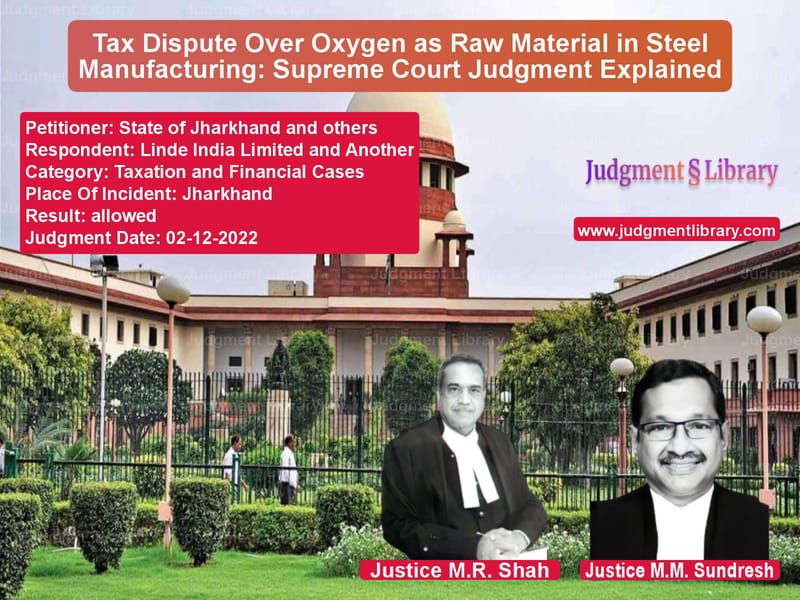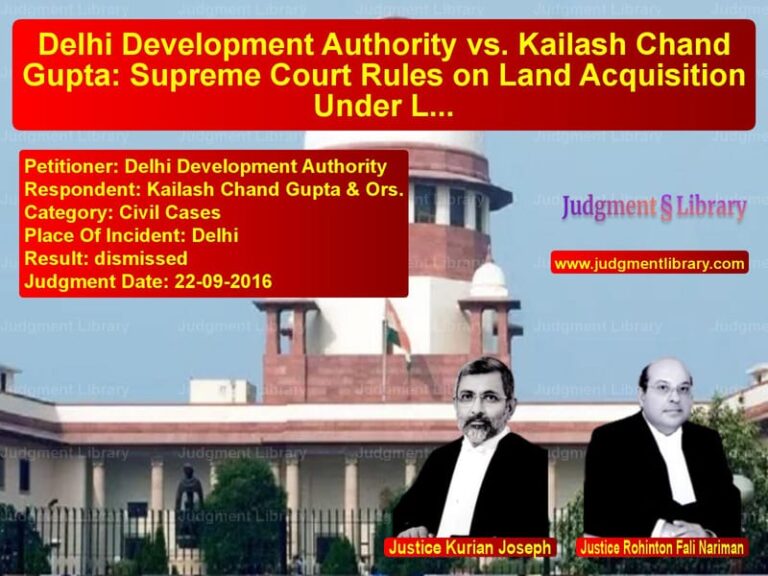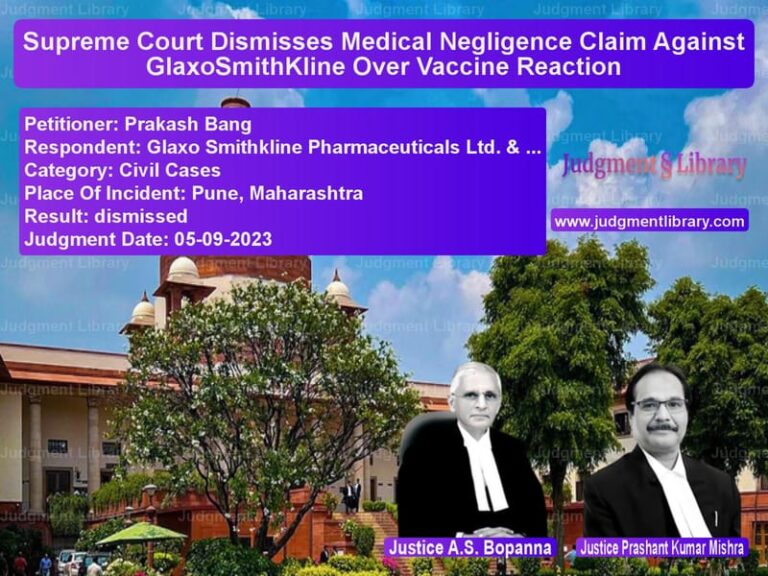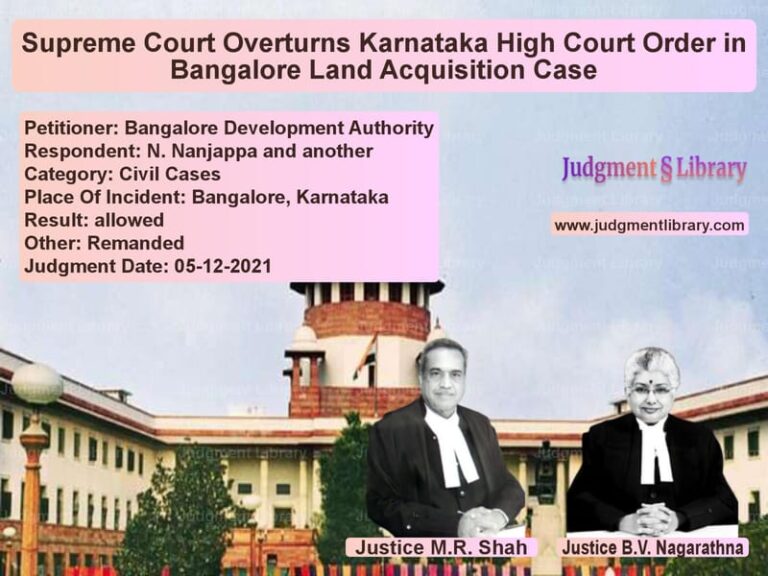Tax Dispute Over Oxygen as Raw Material in Steel Manufacturing: Supreme Court Judgment Explained
The Supreme Court of India recently delivered a significant judgment in the case of State of Jharkhand & Others vs. Linde India Limited & Another, which revolved around a dispute concerning the concessional tax rate applicable to oxygen used in steel manufacturing. The key question before the Court was whether oxygen gas supplied to Tata Steel by Linde India Limited could be classified as a ‘raw material’ for steel manufacturing, thereby qualifying for a reduced tax rate of 2% under the Bihar Finance Act, 1981.
The Supreme Court ultimately ruled in favor of the State of Jharkhand, overturning the High Court’s decision that had granted the tax concession to the respondent companies. This judgment has important implications for the taxation of industrial inputs in India, particularly in sectors that rely on chemical processes.
Background of the Case
The dispute arose when the State of Jharkhand refused to allow Linde India Limited the benefit of a concessional tax rate on the sale of oxygen to Tata Steel. The key developments leading to the case are as follows:
- A certificate under the Bihar Finance Act, 1957, was initially issued for concessional tax on certain raw materials.
- The State Government issued a notification in 1982 fixing a special tax rate of 1% for raw materials.
- Further clarifications in 1983 and 1986 modified the scope of concessional taxation.
- The State argued that oxygen was not a ‘raw material’ but a ‘refining agent,’ thus not eligible for the concessional rate.
Petitioner’s Arguments (State of Jharkhand)
The counsel for the State of Jharkhand contended:
- Oxygen used in steel manufacturing does not form part of the final product and merely acts as a ‘refining agent.’
- As per a report by a six-member expert committee, oxygen helps remove carbon but does not become part of the final steel product.
- The assessment officer, Deputy Commissioner, and Joint Commissioner had all upheld the State’s stand that oxygen should be taxed at 3%.
- The High Court had overstepped its jurisdiction by interfering with the findings of tax authorities, which were based on expert opinion.
Respondent’s Arguments (Linde India & Tata Steel)
The respondents, Linde India Limited and Tata Steel, argued:
- Oxygen is essential for the steel manufacturing process as it reduces the carbon content in pig iron to produce steel.
- The process, known as Basic Oxygen Steelmaking (BOS), is impossible without oxygen, making it an indispensable raw material.
- The High Court correctly determined that a ‘refining agent’ is not mutually exclusive from being a ‘raw material.’
- The precedent set in Collector of Central Excise vs. Ballarpur Industries Ltd. (1989) supports the classification of oxygen as a raw material.
Supreme Court’s Judgment
The Supreme Court ruled in favor of the State of Jharkhand, reinstating the original assessment orders. The key observations included:
- As per the expert committee’s findings, oxygen’s primary role is to reduce carbon in iron, making it a ‘refining agent,’ not a raw material.
- The High Court erred by overriding the factual conclusions reached by tax authorities.
- Prior to the bifurcation of Bihar and Jharkhand, the 3% tax rate was undisputedly paid, and the sudden challenge was unjustified.
- The principle from Thomas Stephen & Co. Ltd. (1988) was upheld, distinguishing between raw materials and auxiliary substances like fuel.
Impact of the Judgment
This decision sets a precedent in taxation disputes related to industrial inputs. The ruling clarifies that an element used in manufacturing does not automatically qualify as a raw material if it does not become part of the final product.
Businesses in manufacturing sectors, particularly those using chemical processes, must carefully evaluate tax liabilities on industrial inputs. The judgment underscores the authority of expert committees in tax assessments and limits judicial intervention in well-established administrative findings.
While the ruling favors the government’s stance, it also raises questions about the need for a clearer legislative definition of ‘raw material’ to avoid similar disputes in the future.
Petitioner Name: State of Jharkhand and others.Respondent Name: Linde India Limited and Another.Judgment By: Justice M.R. Shah, Justice M.M. Sundresh.Place Of Incident: Jharkhand.Judgment Date: 02-12-2022.
Don’t miss out on the full details! Download the complete judgment in PDF format below and gain valuable insights instantly!
Download Judgment: state-of-jharkhand-a-vs-linde-india-limited-supreme-court-of-india-judgment-dated-02-12-2022.pdf
Directly Download Judgment: Directly download this Judgment
See all petitions in Tax Refund Disputes
See all petitions in Banking Regulations
See all petitions in Judgment by Mukeshkumar Rasikbhai Shah
See all petitions in Judgment by M.M. Sundresh
See all petitions in allowed
See all petitions in supreme court of India judgments December 2022
See all petitions in 2022 judgments
See all posts in Taxation and Financial Cases Category
See all allowed petitions in Taxation and Financial Cases Category
See all Dismissed petitions in Taxation and Financial Cases Category
See all partially allowed petitions in Taxation and Financial Cases Category







